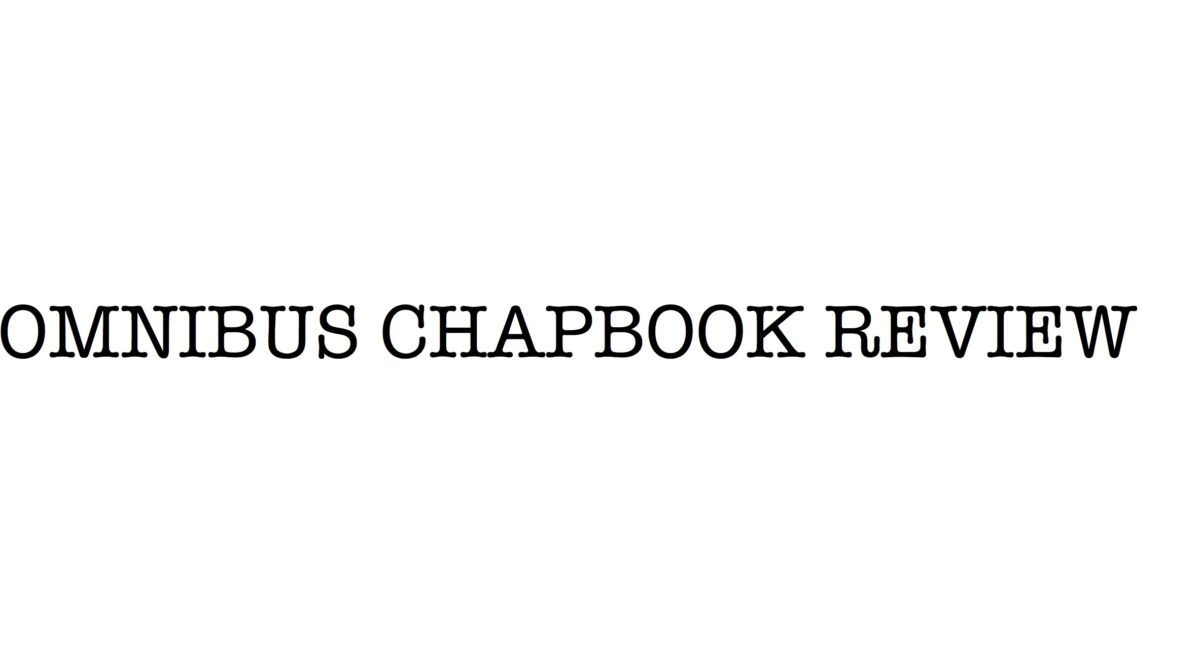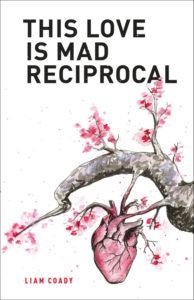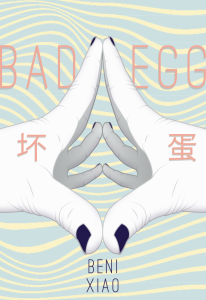
Reviews by Esther Chen
This Love Is Mad Reciprocal – Liam Coady
Glass Buffalo
 On the cover of Liam Coady’s chapbook This Love Is Mad Reciprocal, the blossoming branch of a cherry blossom tree bears fruit in the form of a flushed, anatomically correct heart. The image is fitting for the content, illustrating a theme that returns persistently in this book: love can grow and be found in places you wouldn’t usually expect. The tone in Coady’s poems alternates between melancholy and hope. The speaker “cr[ies] in the quiet”, their mind a “black ocean”. One poem contains a paragraph of apologies (“Sore from sorry. Sorrowful sorry. I don’t know. I’m just sorry.”). In another, the speaker mails “postcards to the universe / With a ‘P.S. Please reply back.’” While the pain is clear, what stands out most in this collection is that the speaker continues to reiterate the appreciation they feel for the world in spite of the darkness they experience. Memories and the places that accompany them are recalled with tender specificity—the old Roxy Theatre, a car ride with Dad in the early morning, a roommate coming home late with a story to tell. With every piece, Coady points to the places and people that sing love back to us when we feel we are shouting into a dark and empty void, wondering if anyone will answer. This Love Is Mad Reciprocal challenges the reader to optimism and thanksgiving—a needed reminder in current times.
On the cover of Liam Coady’s chapbook This Love Is Mad Reciprocal, the blossoming branch of a cherry blossom tree bears fruit in the form of a flushed, anatomically correct heart. The image is fitting for the content, illustrating a theme that returns persistently in this book: love can grow and be found in places you wouldn’t usually expect. The tone in Coady’s poems alternates between melancholy and hope. The speaker “cr[ies] in the quiet”, their mind a “black ocean”. One poem contains a paragraph of apologies (“Sore from sorry. Sorrowful sorry. I don’t know. I’m just sorry.”). In another, the speaker mails “postcards to the universe / With a ‘P.S. Please reply back.’” While the pain is clear, what stands out most in this collection is that the speaker continues to reiterate the appreciation they feel for the world in spite of the darkness they experience. Memories and the places that accompany them are recalled with tender specificity—the old Roxy Theatre, a car ride with Dad in the early morning, a roommate coming home late with a story to tell. With every piece, Coady points to the places and people that sing love back to us when we feel we are shouting into a dark and empty void, wondering if anyone will answer. This Love Is Mad Reciprocal challenges the reader to optimism and thanksgiving—a needed reminder in current times.
The Cosmos – Sean Braune
above/ground press
An experience in itself, reading Sean Braune’s The Cosmos feels like walking through a beauty and cosmetics section in a department store. The chapbook is part of a larger project and gives the reader a glimpse of what he calls “accelerated reading”, a practice that the author says is “essential to the experience of living in the bluster of 21st Century capitalism”. Indeed, the list-like stream of consciousness that makes up the content of The Cosmos is as strange as it is familiar. One section reads: “argan oil lasting sleek / garnier fructis style / prime first for nonstop sleek pre-styling primer / spot the latest coppertone”. The tone feels frantic—the lack of punctuated full stops leaves the reader breathless, as if trying to read out loud the words that pop into one’s mind at every waking moment. As the author explains in his statement on the piece, the variety of texts that surround us read as disembodied—their agency lost in selling a product. By rearranging the selected phrases with creative intent and enjambment (The Cosmos was partly written with the assistance of a stack of Cosmopolitans from 2015), Braune injects voice into washed-up ad copy. “now learn / more dolce & gabbana” the last stanza urges, “we’re light / blue”.
Bad Egg – Beni Xiao
Rahila’s Ghost Press
 Beni Xiao’s debut chapbook Bad Egg is much more than the sum of its parts. The poems speak to one another, clashing and cooperating, forming a complete portrait of a speaker that is as simple as they are complicated. The speaker’s voice changes from page to page. In one, they express a desire to “dot…flesh with the softest kisses a human / could manage”. On the opposite page, they “play god” and cause a volcano to “erupt EVERYWHERE” and “[don’t] even…clean it up”. Bad Egg is full of these juxtapositions—of tone and style (one poem reads: “You are the idea that stars know about us / even a little”, another: “am i too #punkrock 4 u / or are u / not #punkrock enough 4 me”) and of rising above and breaking down. It is tempting, as a reader, to categorize these as different entities altogether. Separating them, however, overlooks the magnetism of this collection. Through careful arrangement, Xiao uses their pieces to hold a mirror to the most extreme parts of ourselves—the most tender, brazen, nervous, and wise corners that no one sees, but that are contained within. Bad Egg gives them each a voice, and lets us in on the conversation.
Beni Xiao’s debut chapbook Bad Egg is much more than the sum of its parts. The poems speak to one another, clashing and cooperating, forming a complete portrait of a speaker that is as simple as they are complicated. The speaker’s voice changes from page to page. In one, they express a desire to “dot…flesh with the softest kisses a human / could manage”. On the opposite page, they “play god” and cause a volcano to “erupt EVERYWHERE” and “[don’t] even…clean it up”. Bad Egg is full of these juxtapositions—of tone and style (one poem reads: “You are the idea that stars know about us / even a little”, another: “am i too #punkrock 4 u / or are u / not #punkrock enough 4 me”) and of rising above and breaking down. It is tempting, as a reader, to categorize these as different entities altogether. Separating them, however, overlooks the magnetism of this collection. Through careful arrangement, Xiao uses their pieces to hold a mirror to the most extreme parts of ourselves—the most tender, brazen, nervous, and wise corners that no one sees, but that are contained within. Bad Egg gives them each a voice, and lets us in on the conversation.
Esther Chen is a writer currently pursuing her BFA in Creative Writing at the University of British Columbia. More of her work can be found her website at estherchen.tumblr.com or on Instagram @softcomix